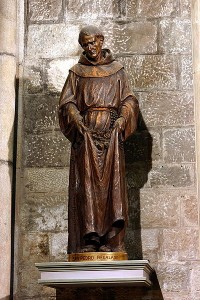 St. Romuald, whose feast we celebrate today, died on June 19, 1027.
St. Romuald, whose feast we celebrate today, died on June 19, 1027.
Monastic life in the eleventh century was difficult—but not difficult enough for Romuald.
As a young man, he entered Sant’Apollinare in Classe, a traditional Benedictine community in Italy. Then, as now, the Church faced corruption within its ranks—with some monks engaged in simony (charging for sacraments or for offices within the Church) and concubinage (an ongoing immoral relationship with a woman). In Romuald’s monastery, an attempt was made to correct these sinful practices by implementing reforms which had first been tested at the Abbey of Cluny.
But Romuald, in a quest for personal holiness, sought an even more ascetic and solitary lifestyle; and he chose to live under the guidance of Marinus, a stern spiritual master. Romuald established his own monastic hermitage, founding the Camaldolese order.
Romuald admonished the young monks, encouraging them to embrace spiritual practices. His brief Rule for the monks of the Camaldolese order instructed them:
Sit in your cell as in paradise. Put the whole world behind you and forget it. Watch your thoughts like a good fisherman watching for fish. The path you must follow is in the Psalms — never leave it.
If you have just come to the monastery, and in spite of your good will you cannot accomplish what you want, take every opportunity you can to sing the Psalms in your heart and to understand them with your mind.
And if your mind wanders as you read, do not give up; hurry back and apply your mind to the words once more.
Realize above all that you are in God’s presence, and stand there with the attitude of one who stands before the emperor.
Empty yourself completely and sit waiting, content with the grace of God, like the chick who tastes nothing and eats nothing but what his mother brings him.












